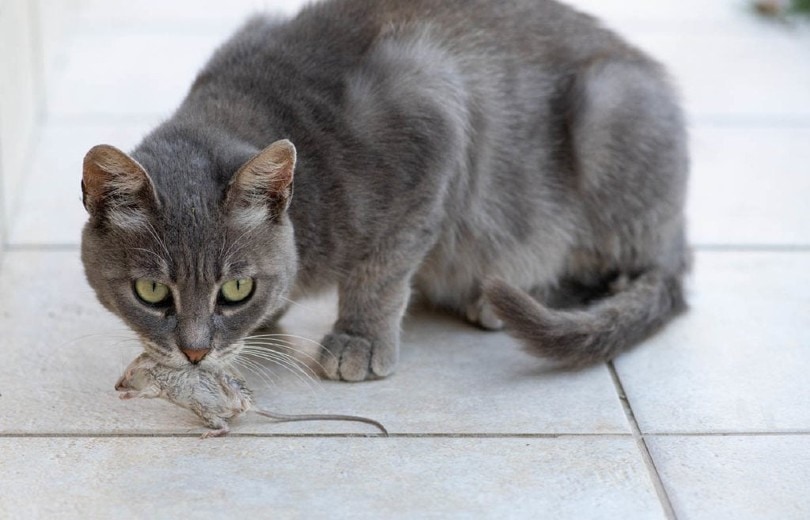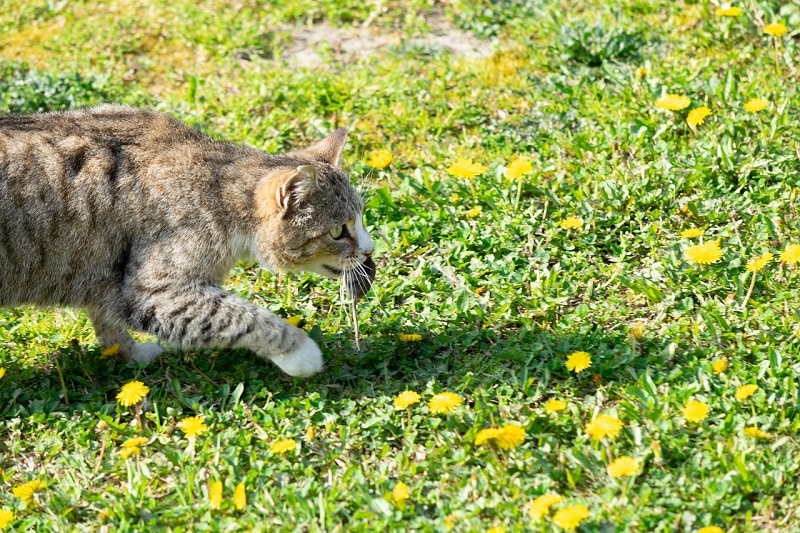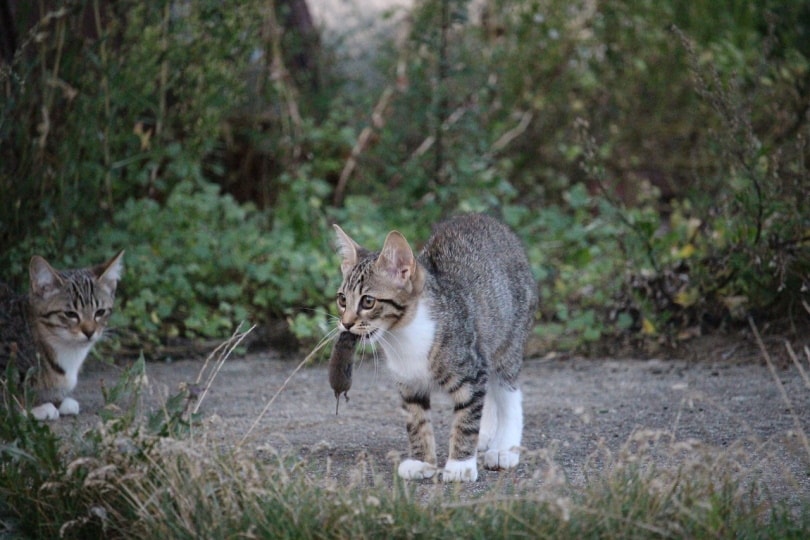
It’s something many cat owners understand. You let your kitty go outside only to find a dead mouse on your doormat hours later, or—heaven forbid—still alive on the kitchen floor. Many people refer to this behavior as your pet bringing you a gift and science shows it’s part of their instinctive prey drive. That may be a bit simplistic or anthropomorphic. After all, cats aren’t little, furry people.

Taking Care of Their Young
It’s safe to say that it’s most common in felines. However, the act of bringing food to another animal isn’t unique to them. Many other species do the same thing with their young, from birds to wolves. You’ll see it in altricial young who are born helpless and need their parents’ help to survive. Canines will also take prey to their dens to feed their pups. That explains one reason behind this behavior.
Your home is your kitty’s den. It suggests an association between parents and their young. The ancestors of the domesticated cat diverged from other felines about 8 to 10 million years ago. Then as now, they are solitary animals. The social group that exists is between the adults and their kittens.
This makes us wonder how our cats view us. Are we standing in for their young?
Survival
It’s a tough life being a predator. After all, it’s not a given that you’ll always be successful when you hunt. The percentage of kills is surprisingly low, especially for solitary animals. African Wild Dogs are the luckiest, with an 85% success rate. Felines aren’t as fortunate. Even lions only bring home food 25 percent of the time. Domestic cats outdo the king of the jungle at 32%.
If your pet takes its prey home, it’s taking advantage of a successful hunt, even if it’s not going to eat it right away. Food is hard to come by in the wild.

The Pet-Owner Bond
Some pet owners like to think of their cats bringing home dead animals as an act of love. Scientists have explored the bond dogs share with humans with a lot of research. We know much more about our relationship with canines than felines. However, interest has increased with more exploration into these bonds. Science has uncovered evidence that cats form bonds with their owners.
We’ve learned that our pets read our emotions. They can learn their names. They figure out our schedules to greet us when we come home. Many of us would call that love based on our values. We lavish our cats with food, treats, and toys. Logic tells us that our pets are showing the same emotion. It may not be science, but it certainly feels good when your kitty cuddles up alongside you.
Instinct Behind the Drive
It’s safe to say that cats have their own way of viewing the world. They don’t act like dogs. Instead, they seem like they’re more in touch with their wild side than our canine best friends. That’s a fair assumption, considering that felines lived near humans but not necessarily with them, at least initially. Perhaps it’s true even today. After all, how many pet owners would let their dogs out for the night?
Living with humans changed canine behavior tremendously through the centuries. It’s worth noting that people domesticated dogs about 40,000 years ago. We didn’t get around to doing the same with cats until 12,000 years ago. That means our feline companions are indeed more in touch with their wild side. Many behaviors are reflections of their lives before they became pets.
Think about some common actions you’ve undoubtedly observed in your cat, such as its love of boxes or its stalking birds it sees outside your home’s window. Your cat’s hunting is simply instinct kicking in and letting its prey drive take over to catch a mouse. It brings home its prize because that’s where it lives. Your pet has figured out that it’s a safe place. Why not take its prey there?
It’s worth noting that some felines, like leopards, hide their food. These felines will haul their prey into a tree to keep it safe. Other animals exhibit similar behavior, such as squirrels burying nuts they’ve found. Scientists have also observed the European Wild Cat caching away its food. This species, by the way, is an ancestor of the domesticated cat.

Deterring This Behavior
We understand why you wouldn’t want your cat to share its prey. It’s not pleasant if you have to dispatch the rodent yourself. Although you might be unable to stop your kitty from acting out instinctively, you can do some things to deter it. A sated pet is less likely to look for food elsewhere. We suggest feeding your cat food formulated for its life stage, following the manufacturer’s recommended portion.
Survival and instinct kick in when food isn’t plentiful. These things will encourage a cat to hunt and maybe bring its catch home to share. We recommend giving your pet a high-protein diet. That will keep your kitty feeling sated longer and less likely to look to supplement it.
Rodents and other wildlife often carry parasites and other disease-causing microorganisms that can put you, your pet, and your family at risk of health conditions. The other concern rests with pest control. Many pesticides contain ingredients that can also harm your cat. Of course, one of the best solutions is to keep your pet indoors. Nevertheless, we understand that it’s not a guarantee to deter the behavior.

Conclusion
Many animals operate on autopilot with behaviors that can help ensure their survival. Your cat probably acts the same way. Bringing food to its den provides a safe place for it to enjoy its hard-won feast away from other predators that might try to steal it. However, we get it. We also like the idea of our pet sharing its take with us as a gift of love. After all, it makes it seem less disagreeable even if we don’t like it.
Featured Image Credit: Markos-Loizou, Shutterstoc





